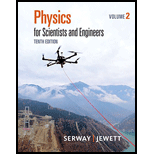
Concept explainers
(a) Use the data in Problem 3 to construct a smooth graph of position versus time. (b) By constructing tangents to the x(t) curve, find the instantaneous velocity of the car at several instants. (c) Plot the instantaneous velocity versus time and, from this information, determine the average acceleration of the car. (d) What was the initial velocity of the car?
(a)
The graph of position versus time.
Answer to Problem 10P
Therefore, the smooth graph of position versus time is shown in Figure I.
Explanation of Solution
The following table contains the data of position of the car at various time instants.
Draw the graph of position versus time for the derby car.
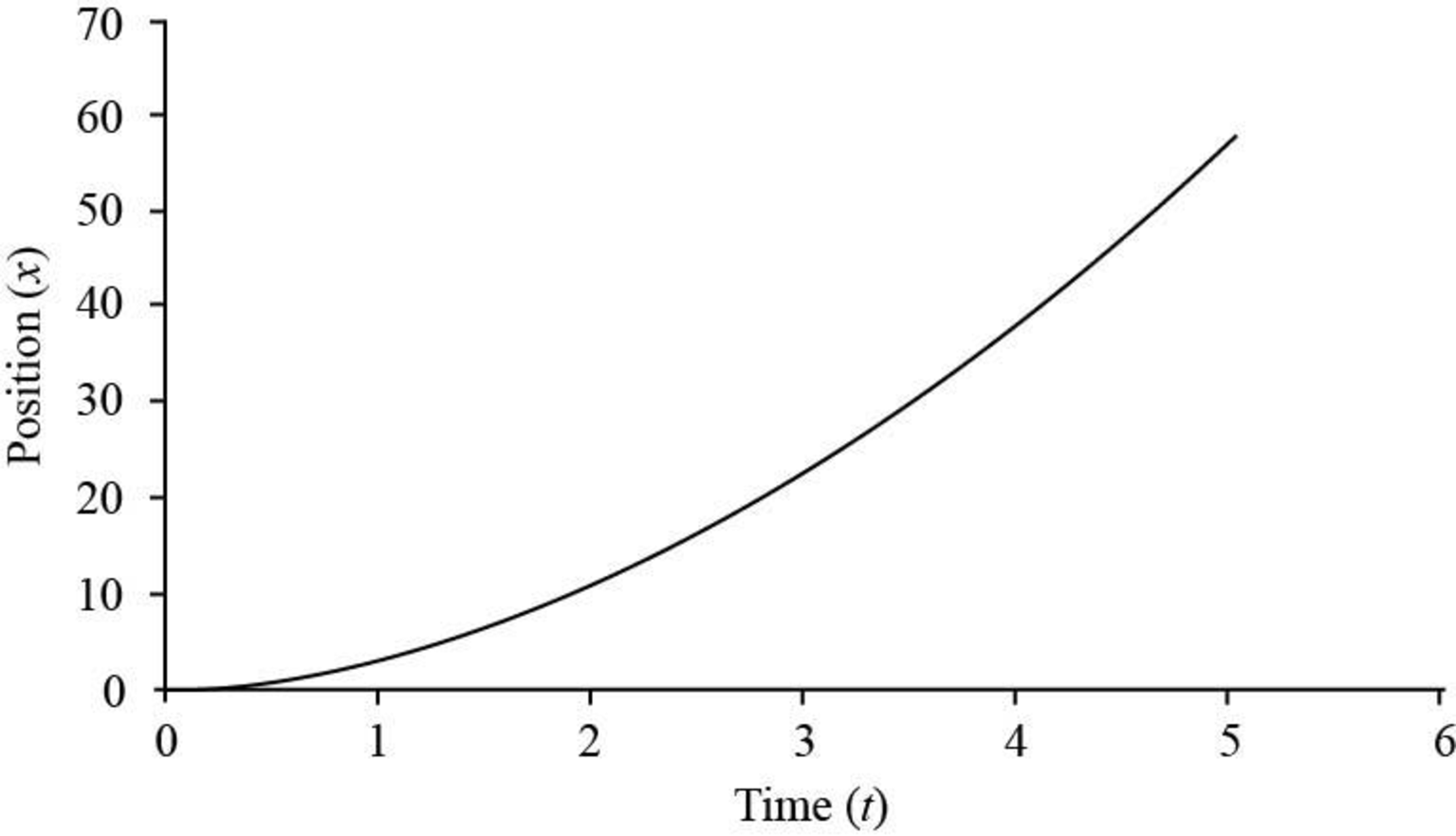
Figure I
In the shown graph, the position of the car at various time instants is plotted in the vertical axis against the time along horizontal direction.
Conclusion:
Therefore, the smooth graph of position versus time is shown in Figure I.
(b)
The instantaneous velocity of the car at various time instants.
Answer to Problem 10P
The instantaneous velocity of the car at
Explanation of Solution
The following table contains the data of position of the car at various time instants.
The instantaneous velocity is the slope of the tangent of the position versus time graph at an instant.
Formula to calculate the slope of the tangent is,
Here,
Draw the tangent line at the time instant of
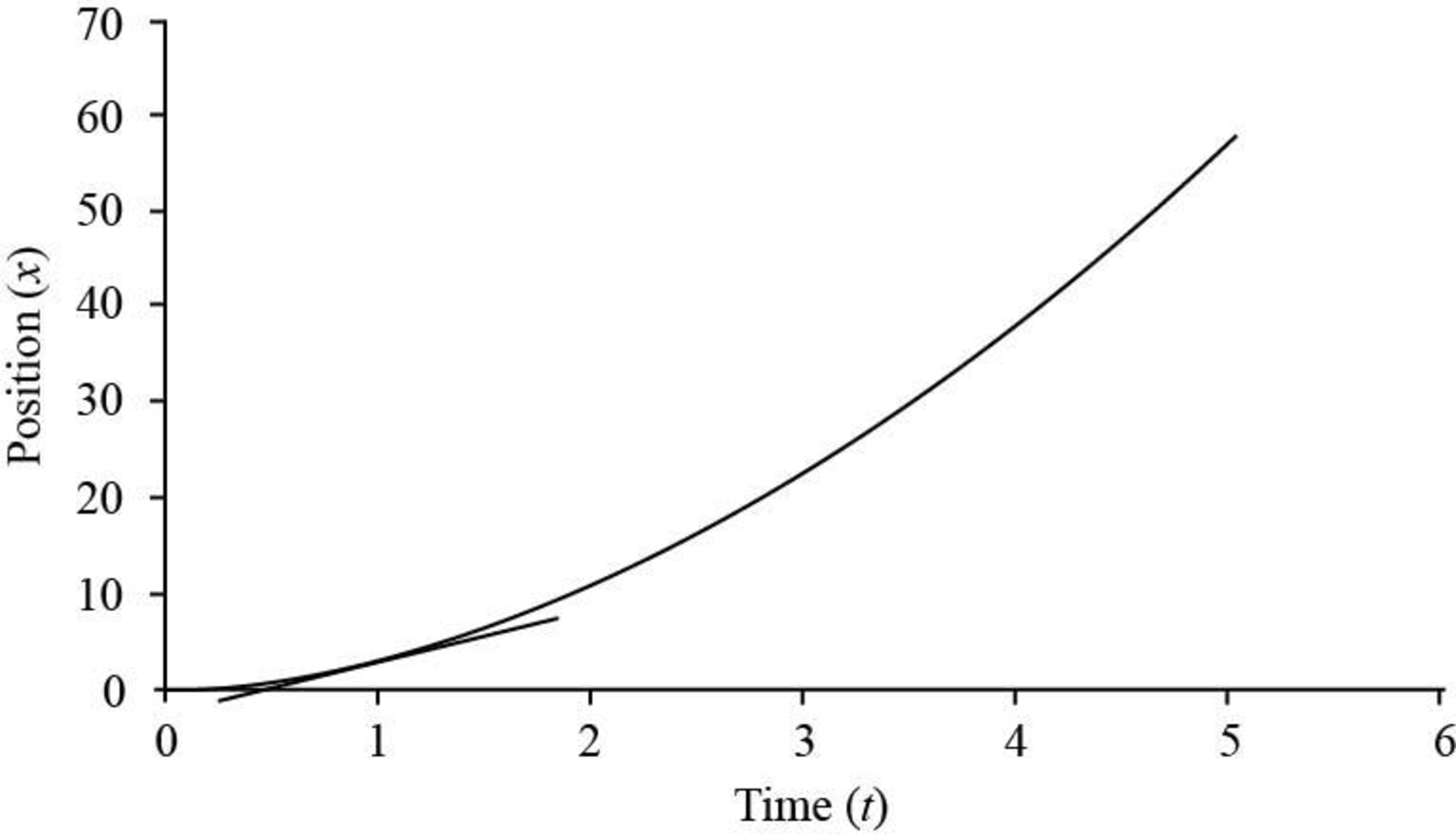
Figure II
Substitute
Therefore, the instantaneous velocity of the car at
Draw the tangent line at the time instant of
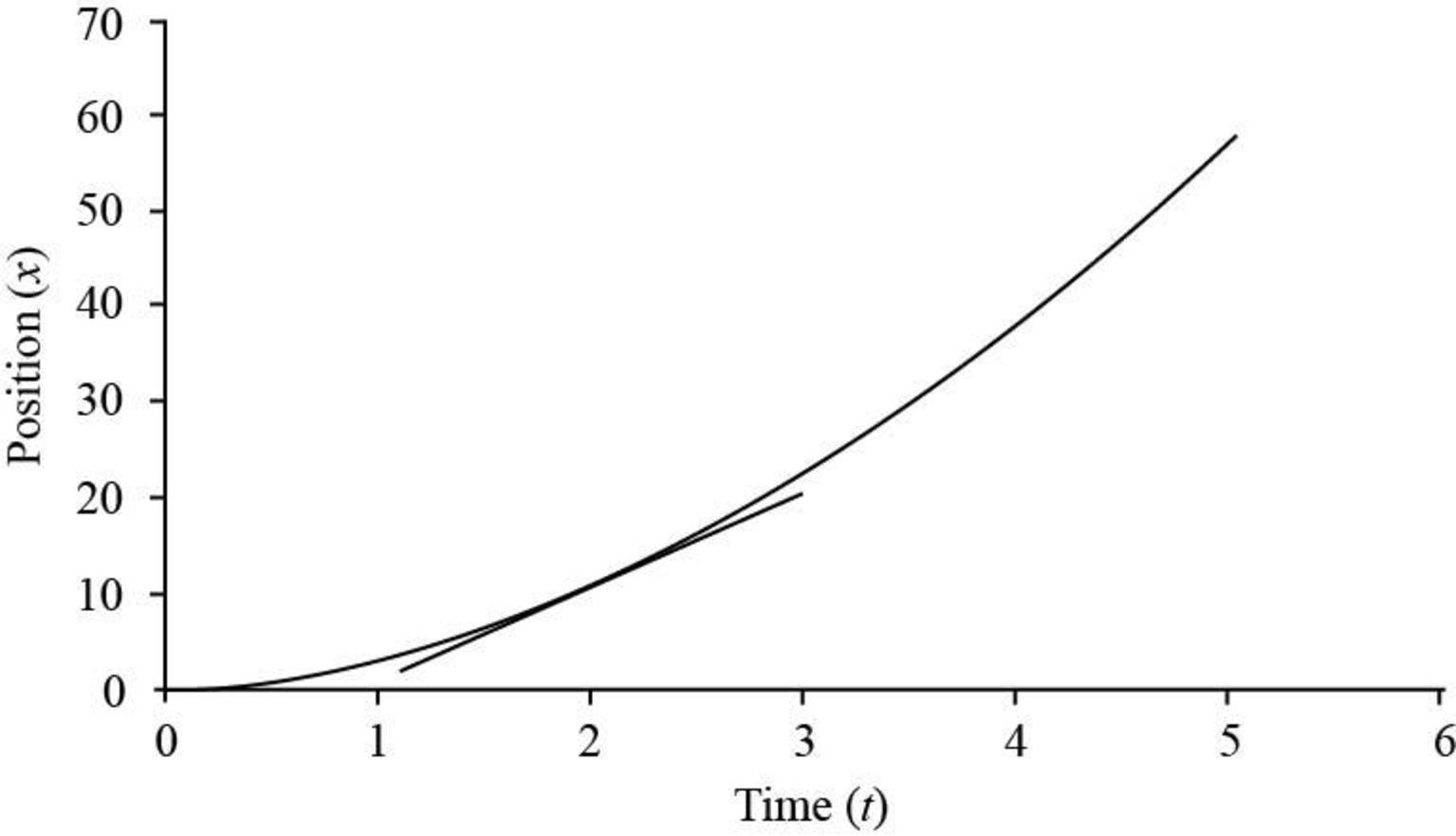
Figure III
Substitute
Therefore, the instantaneous velocity of the car at
Draw the tangent line at the time instant of
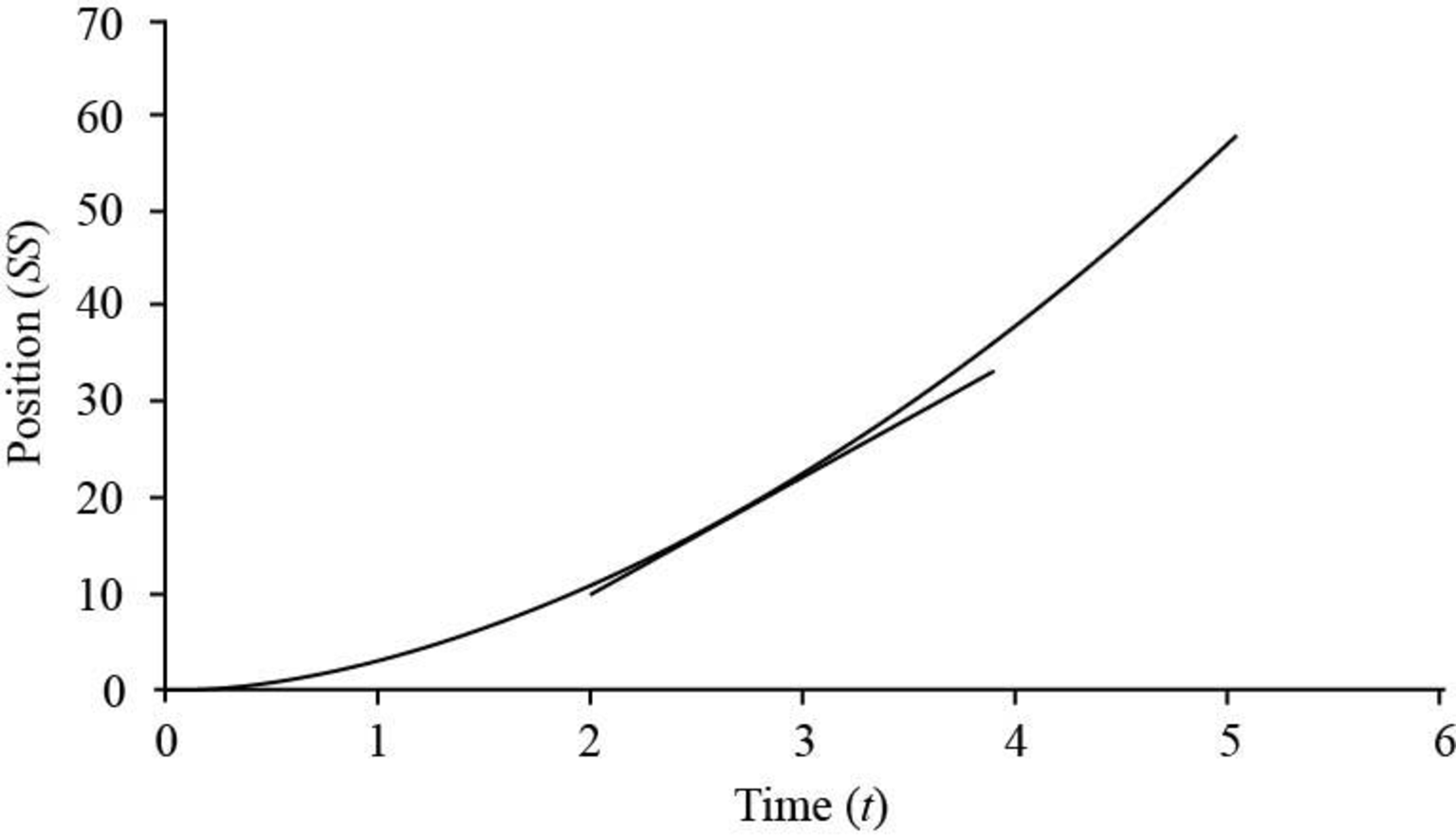
Figure IV
Substitute
Therefore, the instantaneous velocity of the car at
Draw the tangent line at the time instant of
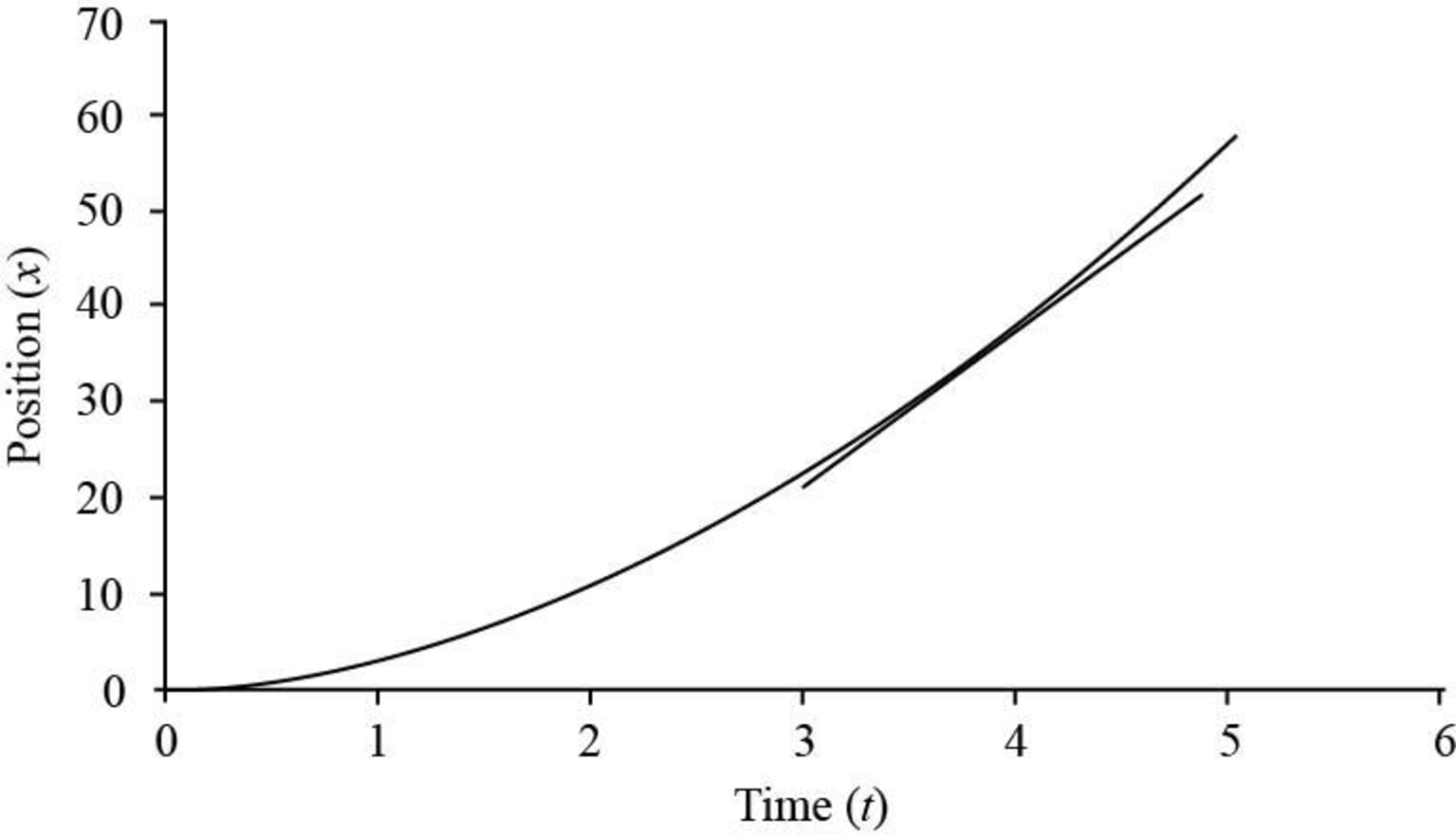
Figure V
Substitute
Therefore, the instantaneous velocity of the car at
Draw the tangent line at the time instant of
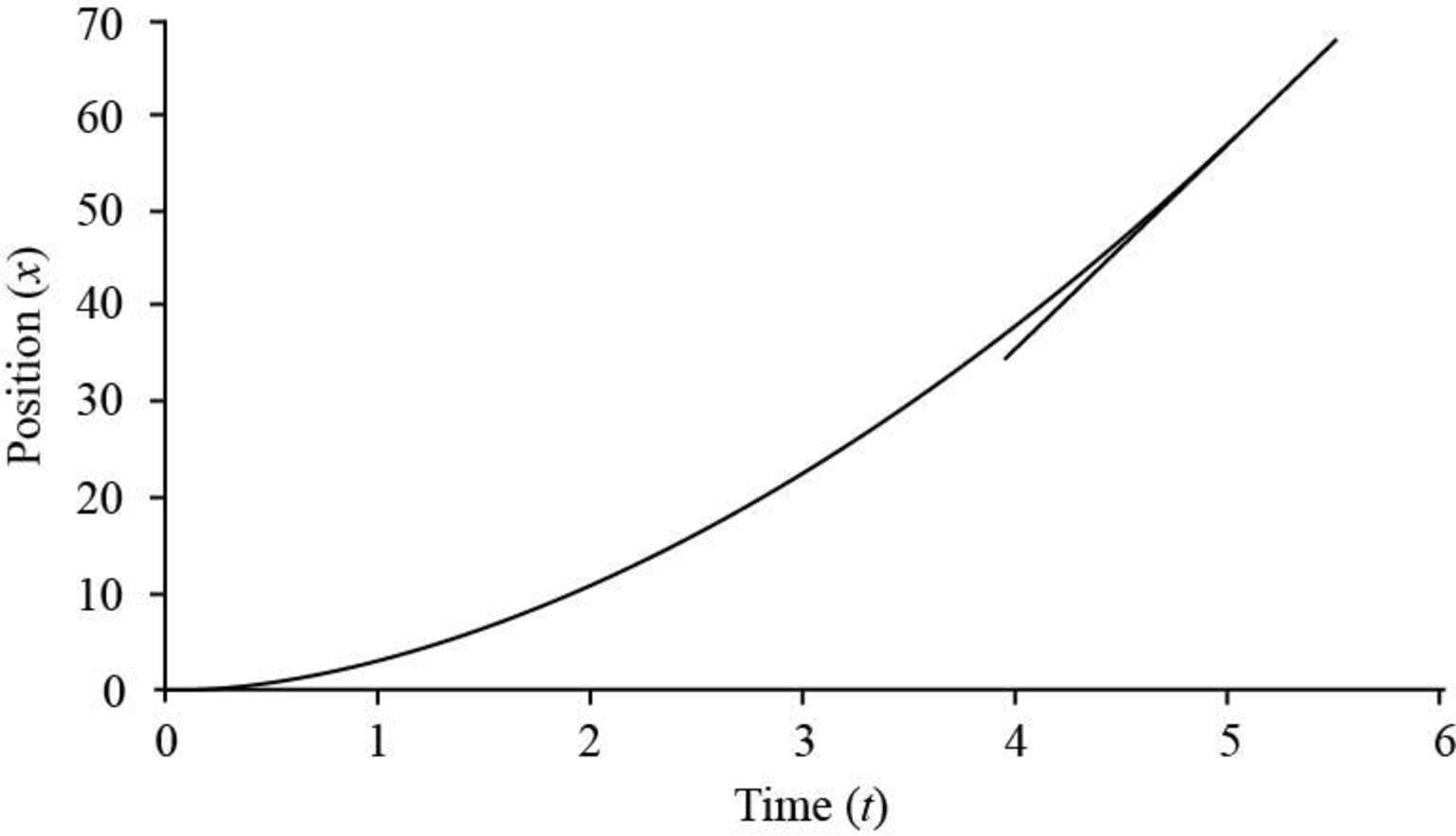
Figure VI
Substitute
Conclusion:
Therefore, the instantaneous velocity of the car at
(c)
The average acceleration of the car.
Answer to Problem 10P
The average acceleration of the car is
Explanation of Solution
The following table contains the instantaneous velocity of the car at various times instant.
The graph of instantaneous velocity versus time for the derby car is shown below.
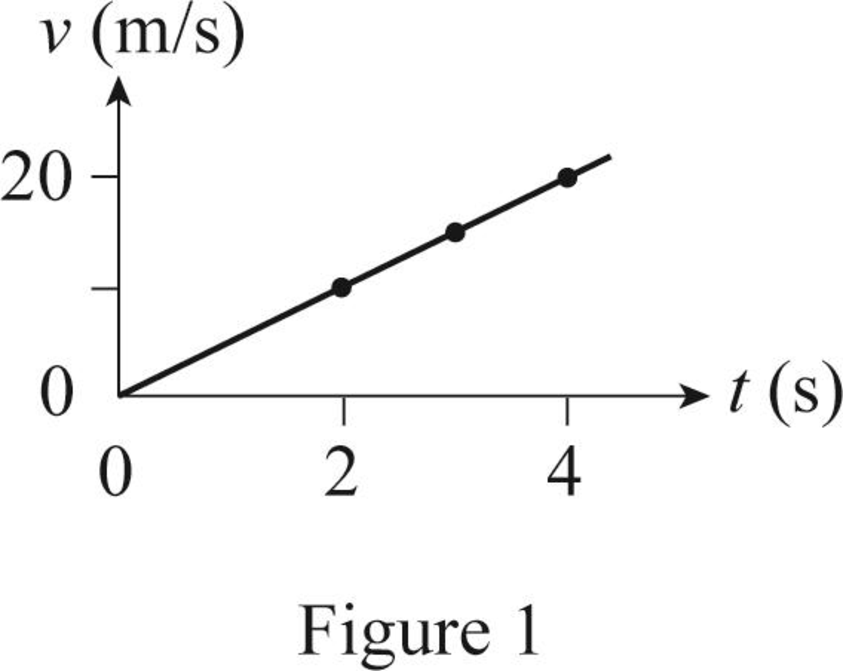
Figure VII
The figure VII shows that velocity of the car increases linearly, it means the acceleration of the car is constant throughout the motion.
Thus, the slope of this graph gives the average acceleration of the car.
Formula to calculate the slope of versus time graph is,
Here,
Substitute
From the graph, the slope of the graph is
Conclusion:
Therefore, the average acceleration of the car is
(d)
The initial velocity of the car.
Answer to Problem 10P
The initial velocity of the car is zero.
Explanation of Solution
The equation for the velocity of the car obtained from the graph is,
The first equation of motion gives the velocity of an object at any instant.
Here,
Compare equation (I) and (II).
Thus, the initial velocity of the car is zero.
Conclusion:
Therefore, the initial velocity of the car is zero.
Want to see more full solutions like this?
Chapter 2 Solutions
Physics for Scientists and Engineers, Volume 2
Additional Science Textbook Solutions
College Physics: A Strategic Approach (3rd Edition)
Cosmic Perspective Fundamentals
Essentials of Human Anatomy & Physiology (12th Edition)
Fundamentals of Anatomy & Physiology (11th Edition)
- An L-C circuit has an inductance of 0.410 H and a capacitance of 0.250 nF . During the current oscillations, the maximum current in the inductor is 1.80 A . What is the maximum energy Emax stored in the capacitor at any time during the current oscillations? How many times per second does the capacitor contain the amount of energy found in part A? Please show all steps.arrow_forwardA long, straight wire carries a current of 10 A along what we’ll define to the be x-axis. A square loopin the x-y plane with side length 0.1 m is placed near the wire such that its closest side is parallel tothe wire and 0.05 m away.• Calculate the magnetic flux through the loop using Ampere’s law.arrow_forwardDescribe the motion of a charged particle entering a uniform magnetic field at an angle to the fieldlines. Include a diagram showing the velocity vector, magnetic field lines, and the path of the particle.arrow_forward
- Discuss the differences between the Biot-Savart law and Coulomb’s law in terms of their applicationsand the physical quantities they describe.arrow_forwardExplain why Ampere’s law can be used to find the magnetic field inside a solenoid but not outside.arrow_forward3. An Atwood machine consists of two masses, mA and m B, which are connected by an inelastic cord of negligible mass that passes over a pulley. If the pulley has radius RO and moment of inertia I about its axle, determine the acceleration of the masses mA and m B, and compare to the situation where the moment of inertia of the pulley is ignored. Ignore friction at the axle O. Use angular momentum and torque in this solutionarrow_forward
- A 0.850-m-long metal bar is pulled to the right at a steady 5.0 m/s perpendicular to a uniform, 0.650-T magnetic field. The bar rides on parallel metal rails connected through a 25-Ω, resistor (Figure 1), so the apparatus makes a complete circuit. Ignore the resistance of the bar and the rails. Please explain how to find the direction of the induced current.arrow_forwardFor each of the actions depicted, determine the direction (right, left, or zero) of the current induced to flow through the resistor in the circuit containing the secondary coil. The coils are wrapped around a plastic core. Immediately after the switch is closed, as shown in the figure, (Figure 1) in which direction does the current flow through the resistor? If the switch is then opened, as shown in the figure, in which direction does the current flow through the resistor? I have the answers to the question, but would like to understand the logic behind the answers. Please show steps.arrow_forwardWhen violet light of wavelength 415 nm falls on a single slit, it creates a central diffraction peak that is 8.60 cm wide on a screen that is 2.80 m away. Part A How wide is the slit? ΟΙ ΑΣΦ ? D= 2.7.10-8 Submit Previous Answers Request Answer × Incorrect; Try Again; 8 attempts remaining marrow_forward
- Two complex values are z1=8 + 8i, z2=15 + 7 i. z1∗ and z2∗ are the complex conjugate values. Any complex value can be expessed in the form of a+bi=reiθ. Find θ for (z1-z∗2)/z1+z2∗. Find r and θ for (z1−z2∗)z1z2∗ Please show all stepsarrow_forwardCalculate the center of mass of the hollow cone shown below. Clearly specify the origin and the coordinate system you are using. Z r Y h Xarrow_forward12. If all three collisions in the figure below are totally inelastic, which will cause more damage? (think about which collision has a larger amount of kinetic energy dissipated/lost to the environment? I m II III A. I B. II C. III m m v brick wall ע ע 0.5v 2v 0.5m D. I and II E. II and III F. I and III G. I, II and III (all of them) 2marrow_forward
 Principles of Physics: A Calculus-Based TextPhysicsISBN:9781133104261Author:Raymond A. Serway, John W. JewettPublisher:Cengage Learning
Principles of Physics: A Calculus-Based TextPhysicsISBN:9781133104261Author:Raymond A. Serway, John W. JewettPublisher:Cengage Learning University Physics Volume 1PhysicsISBN:9781938168277Author:William Moebs, Samuel J. Ling, Jeff SannyPublisher:OpenStax - Rice University
University Physics Volume 1PhysicsISBN:9781938168277Author:William Moebs, Samuel J. Ling, Jeff SannyPublisher:OpenStax - Rice University Physics for Scientists and Engineers, Technology ...PhysicsISBN:9781305116399Author:Raymond A. Serway, John W. JewettPublisher:Cengage Learning
Physics for Scientists and Engineers, Technology ...PhysicsISBN:9781305116399Author:Raymond A. Serway, John W. JewettPublisher:Cengage Learning Glencoe Physics: Principles and Problems, Student...PhysicsISBN:9780078807213Author:Paul W. ZitzewitzPublisher:Glencoe/McGraw-Hill
Glencoe Physics: Principles and Problems, Student...PhysicsISBN:9780078807213Author:Paul W. ZitzewitzPublisher:Glencoe/McGraw-Hill College PhysicsPhysicsISBN:9781938168000Author:Paul Peter Urone, Roger HinrichsPublisher:OpenStax College
College PhysicsPhysicsISBN:9781938168000Author:Paul Peter Urone, Roger HinrichsPublisher:OpenStax College College PhysicsPhysicsISBN:9781285737027Author:Raymond A. Serway, Chris VuillePublisher:Cengage Learning
College PhysicsPhysicsISBN:9781285737027Author:Raymond A. Serway, Chris VuillePublisher:Cengage Learning





